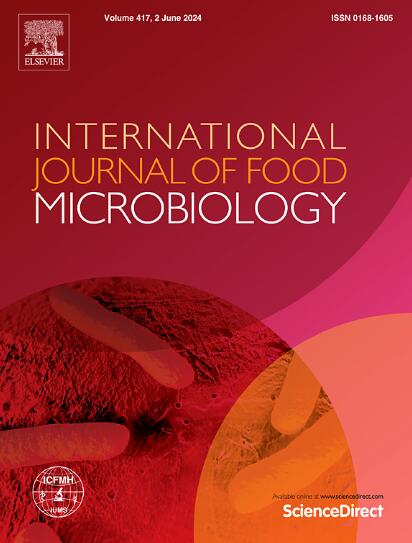Frontier research on the risk of spoilage microorganisms in refrigerated marine fish: From regional to global perspectives
IF 5.2
1区 农林科学
Q1 FOOD SCIENCE & TECHNOLOGY
International journal of food microbiology
Pub Date : 2025-09-23
DOI:10.1016/j.ijfoodmicro.2025.111465
引用次数: 0
Abstract
Microbial spoilage is creating safety risks and significant wastage of refrigerated marine fish. Spoilage microorganisms possess distinct physiological adaptations that enable them to contribute to the spoilage of refrigerated marine fish, thereby complicating the accuracy of microbial risk predictions and the efficacy of control strategies. This review integrates research findings from diverse geographical regions to elucidate mechanisms of microbial spoilage and underscores the ongoing challenges in cross-regional collaborative studies. Omics serve as guiding tools for elucidating the molecular mechanisms by which metabolite mediate spoilage microorganisms-induced deterioration of flavor, texture, and safety. Quantitative Microbial Risk Assessment (QMRA) provides a critical framework for risk prediction, with its future development being intrinsically linked to the integration of omics data, rapid fluorescence sensing, and artificial intelligence (AI) for enhanced prediction and modeling. In conclusion, this review underscores the critical role of spoilage microorganisms in the deterioration of refrigerated marine fish, highlights the complex interplay between microbial ecology, cold adaptation, and spoilage potential, and emphasizes the necessity for collaborative global efforts. Advancing research on native microbial communities, molecular spoilage mechanisms, and AI-powered QMRA frameworks is paramount for reducing food waste, enhancing food safety risk assessment, and the sustainable development of preservation technology.
冷藏海鱼腐败微生物风险的前沿研究:从区域到全球视角
微生物腐败造成了安全风险,并严重浪费了冷藏海鱼。腐败微生物具有独特的生理适应性,使它们能够导致冷藏海鱼的腐败,从而使微生物风险预测的准确性和控制策略的有效性复杂化。本文综述了来自不同地理区域的研究成果,以阐明微生物腐败的机制,并强调了跨区域合作研究中存在的挑战。组学是阐明代谢物介导腐败微生物引起的风味、质地和安全性恶化的分子机制的指导工具。定量微生物风险评估(QMRA)为风险预测提供了一个关键框架,其未来发展与组学数据、快速荧光传感和人工智能(AI)的整合有着内在的联系,以增强预测和建模。总之,本综述强调了腐败微生物在冷藏海鱼变质中的关键作用,强调了微生物生态、冷适应和腐败潜力之间复杂的相互作用,并强调了全球合作努力的必要性。推进原生微生物群落、分子腐败机制和人工智能QMRA框架的研究,对于减少食物浪费、加强食品安全风险评估和保鲜技术的可持续发展至关重要。
本文章由计算机程序翻译,如有差异,请以英文原文为准。
求助全文
约1分钟内获得全文
求助全文
来源期刊
CiteScore
10.40
自引率
5.60%
发文量
322
审稿时长
65 days
期刊介绍:
The International Journal of Food Microbiology publishes papers dealing with all aspects of food microbiology. Articles must present information that is novel, has high impact and interest, and is of high scientific quality. They should provide scientific or technological advancement in the specific field of interest of the journal and enhance its strong international reputation. Preliminary or confirmatory results as well as contributions not strictly related to food microbiology will not be considered for publication.

 求助内容:
求助内容: 应助结果提醒方式:
应助结果提醒方式:


